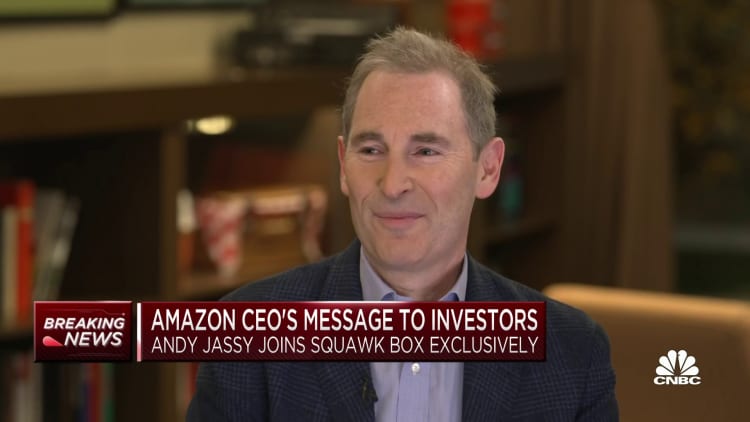[ad_1]

Amazon CEO Andy Jassy said he doesn’t pay much attention to the company’s stock price, even after the shares lost half their value in 2022 amid fears of a recession and a bad year for tech stocks across the board.
“I don’t spend a lot of my time focused on the stock price,” Jassy said Thursday in an interview with CNBC’s Andrew Ross Sorkin on “Squawk Box.”
Jassy said he prefers to look at the stock’s performance over the long term, rather than focusing on a snapshot in time.
“In any one period of time it may be further up or further down, but it really matters what you do for customers over a long period of time,” he said.
Amazon’s stock tumbled almost 50% in 2022, the biggest annual loss since the dot-com crash in 2000, when it plunged 80%. Its shares have rebounded this year and are up more than 18% year to date. But the stock is still down about 35% from a year ago.
The stock decline caused Jassy’s compensation to crater in 2022. Jassy received compensation valued at about $1.3 million last year, according to securities filings. In 2021, when Jassy took over from founder Jeff Bezos, he was awarded a pay package worth roughly $212 million, of which a significant portion was composed of Amazon stock.
Amazon said in a proxy filing Thursday it did not grant Jassy any new stock in 2022.
Investors have applauded Jassy’s cost-cutting in recent months. Amazon went on a hiring and building binge during the pandemic as a result of a boom in e-commerce. That demand started to cool last year, and Jassy and other Amazon executives admitted they misjudged how long the surge would last.
Amazon initiated the largest layoffs in its 29-year history, cut back on several experimental projects and froze corporate hiring. It also took steps to reevaluate its fulfillment network to better optimize costs, after its footprint grew larger and the company spent more money to deliver goods quickly from one corner of the country to another, Jassy wrote in his shareholder letter Thursday.
The concerns extend beyond rising costs. Amazon is also grappling with slowing growth in its two largest businesses, retail and cloud computing, as inflation-weary consumers are more cautious about discretionary purchases and enterprises pull back on their cloud spending amid rising inflation and a worsening economic outlook.
“Despite growing 29% year-over-year (“YoY”) in 2022 on a $62B revenue base, AWS faces short-term headwinds right now as companies are being more cautious in spending given the challenging, current macroeconomic conditions,” Jassy said in his letter.
“We have a lot more growth in front of us,” Jassy told CNBC. “The fact that we were able to meaningfully streamline our costs while at the same time preserving the strategic long-term investments that we believe can meaningfully change customer experiences in Amazon for the long term, I think we have a lot to look forward to.”
[ad_2]
Source link
